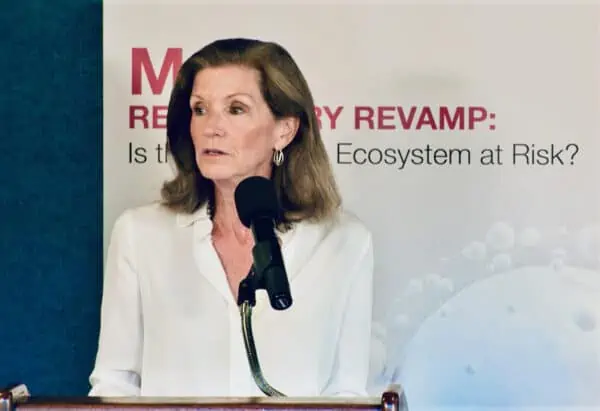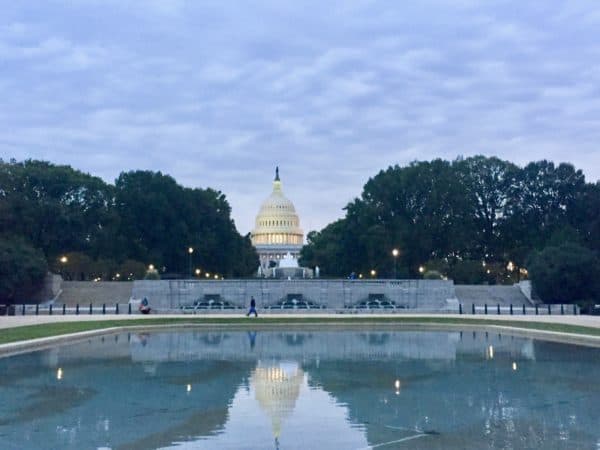The Small Business and Entrepreneurship Council (SBE Council) has long championed entrepreneurship in Washington, DC. Founded in 1994, the SBE Council claims over 100,000 members. Its mission is to educate and advocate on behalf of these smaller firms – which typically do not have the capacity to pursue important policy issues on their own. SBE Council frequently provides surveys and qualitative reports on public policy that impacts its members and the economy in general.
Last month, SBE Council admonished the current administration as well as Congress, demanding when will the President “stop fueling its flames” of policy that’s “digging the U.S. economy into a deep and dreary hole.” Challenges like raging inflation combined with increased regulation and proposals to raise tax rates will undermine the economy. SBE Council explained:
“The threat of more intrusive and expensive government also restricts investment, which means entrepreneurs are impeded from being an active participant in healing the economy and helping to get our supply chains functioning normally. We are also witnessing what happens when policies punish and prevent energy development at home – higher prices with no end in sight. The costly state of the U.S. economy is not working for small businesses.”
SBE Council President Karen Kerrigan is well known within the investment crowdfunding sector as she was promoting the JOBS Act of 2012 long before it became law. In recognition of her efforts, she was present at the White House when President Obama signed the bill into law.
Earlier this month, CI re-connected with Kerrigan to hear about what is going on in Washington, DC, what changes need to be made, and the status of legislation that should improve investment crowdfunding. Our discussion is below.
Inflation is impacting everyone, but it impacts more individuals and businesses that are ill-prepared for an economic downturn. What is the one thing or several policy initiatives the current Administration should be doing now to address this challenge?
Karen Kerrigan: Washington needs to stop fueling instability and uncertainty with the broad range of disruptive regulatory and policy initiatives the Biden Administration and Congress are pursuing. These will vastly raise costs for businesses, including new taxes, and are making an extremely challenging situation must worse. The policy signal is unmistakably anti-business and anti-growth and therefore suppressing the investment needed to help heal supply chains, and to bring energy prices back to reasonable levels.
The list is endless with respect to big policy changes and regulatory initiatives that are aiming to “fix things” that are not broken.
If Washington would simply stop and do a 180 on policy, it would do wonders in terms of improving business confidence and encouraging productive actions that would reduce inflation.
This past May, SBE Council issued a statement on regulatory/legislative changes the Administration should be pursuing to assist small businesses/entrepreneurs – is there any movement on any of this? Either in Congress or the White House?
Karen Kerrigan: Zero constructive movement from the White House. And unfortunately, President Biden has doubled down on policy measures that harm U.S. IP and has stayed the course on adverse tax, regulatory, and government spending measures in general that are harmful to businesses and the economy.
While Congress continues to advance non-helpful legislation, at least there is a check on these various anti-growth bills on the Senate side. That being said, there is a range of solid bipartisan bills that have been introduced in both the House and Senate that would help entrepreneurs and small businesses, but they are not getting any floor time. The one exception was a slate of bills that passed the House in mid-June that would make various changes to SBA and COVID-related programs. These initiatives will be helpful to some small businesses (if the bills are also acted upon in the Senate), but in general, these bills don’t provide the type of relief and support that makes a difference for most small businesses during this challenging inflationary and uncertain economic period.
You have been pretty vocal on legislation that targets Big Tech. These firms offer services that many startups leverage to launch a business. In fact, some believe that just ten years ago the COVID health crisis would have had a dramatically worse impact on the economy because many of these services simply did not exist. Can you please elaborate on the legislation and where it stands?
Karen Kerrigan: Various “big-tech” measures – such as the American Innovation and Choice Online Act (S.2992) and the Platform Competition and Opportunity Act (S.3197) are looking to “fix things” that are not broken. Both of these bills would be highly disruptive to U.S. innovation and the digital economy, and the downstream impact on startups and small businesses would be severe.
With regard to S. 2992, an intrusive regulatory bill that is being dressed up as anti-trust, it would dramatically alter the business models of a few of the big-tech players, which would then disrupt a wide variety of free or low-cost tech tools and services for small businesses. How is taking away the services that give small business access to their customers and potential customers a good thing? How is increasing the costs of these services a positive outcome at a time of high inflation and slowing business revenue?
Small businesses actually understand how damaging S. 2992 would be to their business and the economy – as I noted in a July 12 letter to every member of Congress, 24% of small business owners in our recent Small Business Policy and the Economy survey said they may be forced to close their business if certain tech services were discontinued or if new costs were imposed on these firms. The message from entrepreneurs and small business owners was clear on S. 2992 – it would be bad for U.S. innovation and for small businesses across the economy, it would be harder for small businesses to connect with and acquire new customers, their costs will go higher, and larger or more established businesses would be the big winners.
The Senate Democratic leadership is pushing for a July vote on S. 2992, but too many Democrats and Republicans have serious concerns and questions about the bill. And justifiably so, as it would cause a lot of damage and benefit our major international competitors. Thankfully, our concerns have gotten traction on Capitol Hill, and many members are viewing S. 2992 as too much of a risk as it takes a sledge hammer to the digital ecosystem.
With regard to S. 3197, which would radically alter the mergers and acquisitions process by effectively banning America’s largest four or five technology companies from acquiring firms, it is a big threat to startups and our startup ecosystem. I would encourage your readers to view a recent event we hosted on the legislation, or at a minimum review some of the key quotes of our event participants (which can be found here), as the bill and other actions the Federal Trade Commission (FTC) is looking to take would profoundly impact the M&A framework, which would significantly affect U.S. innovation and our economy – and not for the better.
The Senate has created JOBS Act 4.0 in an attempt to replicate, and perhaps improve upon, the original JOBS Act of 2012. What are the prospects for this legislation?
Karen Kerrigan: I believe the prospects for JOBS Act 4.0 passage are good – eventually, just not right now, given the crowded schedule and the priorities of the Democrat leadership.
Still, we will continue to advocate for JOBS Act 4.0 and specific measures, given their importance to startups and small businesses, but realistically we are probably looking at the new Congress for traction on the package or key elements of the bill.
Getting the country back on stable economic footing – whether we go into a recession or not – will continue to be a big theme as we move into 2023, and measures that improve capital markets, access to capital, and growth for small to mid-size businesses will be a priority.
Which sections of the legislation do you see the most potential? Is there bipartisan support on some or all of this?
 Karen Kerrigan: There is significant bipartisan support on a fair number of measures within JOBS Act 4.0 and I believe we will be able to boost bipartisanship support further as the year progresses and going into the new Congress in 2023.
Karen Kerrigan: There is significant bipartisan support on a fair number of measures within JOBS Act 4.0 and I believe we will be able to boost bipartisanship support further as the year progresses and going into the new Congress in 2023.
Taken together, JOBS Act 4.0 would have a dramatic and positive impact on the capital-markets ecosystem. I am particularly fond of those measures that improve capital access for startups and SMBs by strengthening existing methods – like investment crowdfunding and angel investing – or that unlock latent capital for startups and SMBs by modernizing laws and rules.
SBE Council has a long history of supporting key measures within JOBS Act 4.0 like extending emerging growth company status, the creation of venture exchanges, increasing the size of angel funds, a micro-offering safe harbor, exempting “finders” from SEC broker registration, making it easier and less costly for small companies to sell their businesses, improving crowdfunding by reducing red tape, allowing self-certification of accredited investors, making it easier to allow “gig workers” to receive compensation in the form of equity, and the broad range of reforms within the legislative package that modernize definitions and reporting and streamline rules to reduce cost and to free up more capital.
Innovation in financial services (Fintech) has boomed during the COVID crisis. From your point of view, how has the digitization of financial services helped startups, entrepreneurs and SMEs in general?
Karen Kerrigan: There is a boom in new business applications because of digital transformation across the economy and industries. Not only has this opened-up opportunity for startups and new business creation, but financial services digitization has improved access to markets and capital through speed and lower costs. The embedding and use of Fintech services made it possible to survive the pandemic, and the growth in the digital economy now requires digitally-savvy small business owners. Entrepreneurs and small business owners have cheerfully embraced the digitization of financial services. For example, in our late spring survey of “pandemic startups,” small business founders cited digitization in general as being a “major factor” in encouraging the launch of their businesses during COVID-19 – access to electronic payments options ranked as one of the most important digital features.
What are your members telling you today about the current business environment? How do they feel about 2022? 2023?
Karen Kerrigan: Generally, “it’s tough” out there. The cumulative effect of inflation, slowing sales, and policies from Washington that are alarmingly clueless are hurting business conditions and their businesses. They are girding for the worst, but still hoping for the best. That is what they are saying, which is generally reflected in our latest survey of small business owners across America. Our June 2022 SBE Council-TechnoMetrica survey found that 88% of small business owners believe the economy will move into a recession in the coming months, and they rate economic conditions as “poor” and “fair.” The good news is that most feel equipped to handle whatever will be thrown at them during the rest of the year. Still, 7% of the business owners in our survey say their chances of survival are “poor” and 5% are unsure. If 7% of businesses close, that’s 2-2.5 million business closures.
In general, they view the remainder of 2022 as tough and believe the effects of inflation and the harm of a slowing economy and higher interest rates will linger into 2023, unless there is a dramatic change in the direction of policy. They do not expect that change in 2022. If there is a political change that comes to Washington in 2023, they are optimistic there will be more “balance” when it comes to policy, but they are realistic as to the depth of pro-business changes that can be implemented.



